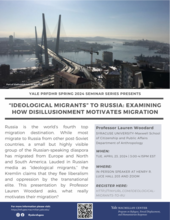Russia is the world’s fourth top migration destination. While most migrate to Russia from other post-Soviet countries, a small but highly visible group of the Russian-speaking diaspora has migrated from Europe and North and South America. Lauded in Russian media as “ideological migrants,” the Kremlin claims that they flee liberalism and oppression by the transnational elite. This presentation by Professor Lauren Woodard asks, what really motivates their migration? How do these so-called “ideological migrants” explain their decision to migrate to Russia, and what are their experiences once they are there? Drawing on ethnographic encounters with some of these migrants in Russia and the United States since 2016, Professor Woodard argues that it is possible to understand these migrants as engaging in a form of moral migration, an ethical attempt to align one’s values with where one lives. In this case, migration is motivated not by aspiration for a morally “good life” but driven by political disillusionment. Attention to moral migration has implications beyond Russia, including for understanding political polarization and migration activism, among other topics.
Dr. Lauren Woodard is an Assistant Professor of Anthropology at the Maxwell School of Citizenship and Public Affairs at Syracuse University. Her research focuses on migration, processes of racialization, borders, settler colonialism, political anthropology, multiculturalism, liberalism, climate change, Russia and the former Soviet Union. Her current book project based on ethnographic fieldwork in Moscow and Vladivostok, “Ambiguous Inclusion: Transforming Migrants into Compatriots on Russia’s Border with China”, examines how officials and migrants negotiate Russia’s migration and diaspora policies on Russia’s border with China.
Her research has been supported by the Kennan Institute Title VIII Research Fellowship, the Wenner-Gren Dissertation Fellowship, and Fulbright research grants to Russia and Kazakhstan, and published in Cultural Anthropology and The Political and Legal Anthropology Review. She has also conducted research on international development and water politics in Central Asia.

